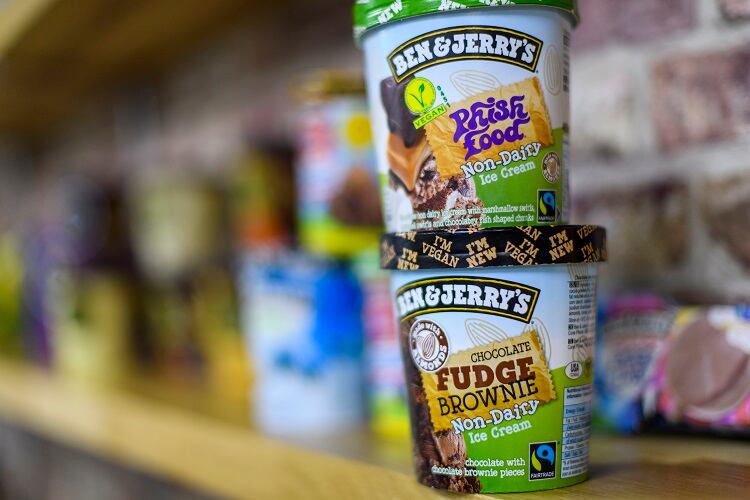Ben & Jerry’s launched its first non-dairy ice cream alternatives in 2016. The brand, which was acquired by Unilever in 2000, has since grown its vegan range to 20 flavours.
For Ben & Jerry’s, non-dairy ice creams now make up 25% of its global product portfolio.
The decision to expand its non-dairy range is likely fuelled by two factors: consumer demand (although no vegan offering made it into Ben & Jerry’s top 10 flavours of 2023 in the UK) and Unilever’s commitment to achieve annual sales of €1.5bn from plant-based products by 2025.
To better mimic its dairy ice cream range, and ultimately win over more consumers, Unilever has been experimenting with Ben & Jerry’s non-dairy base. Having trialled up to 70 different flavour combinations, the company believes it has found its answer in oat.
“It’s been a long journey,” said Unilever flavour specialist João Piva. “But we’re confident we’ve created the best-tasting non-dairy base for Ben & Jerry’s ice cream yet.”
What was wrong with Ben & Jerry’s previous dairy-free ice cream base?
Ben & Jerry’s vegan ice cream bases have traditionally been made with either almonds or sunflower butter. But to better cater to plant-based and flexitarians, the company examined other ingredients with reformulation potential.
“With almond you can experience a nutty aftertaste,” explained Piva. “And as chunks and sauces are a signature of Ben & Jerry’s flavoured ice creams, we were keen to find a base that let our hero ingredients shine more.”
Unilever was also concerned about the texture of its bases, having conducted a survey amongst consumers. “Consumer testing told us that non-dairy ice cream products can sometimes feel thinner or watery,” a company spokesperson told FoodNavigator.
“We wanted to find an ingredient that would close that texture gap.”
The goal was to find an ingredient and base formulation that ensured the brand’s ‘signature’ taste was maintained. The team – made up of Piva, Unilever science and technology experts and Ben & Jerry’s US contingent – believes it has achieved that with oats.
Plant-based ice cream takes a shine to oats
Oats are not new to plant-based dairy, nor new to plant-based ice cream. Between April 2022 and March 2023, Mintel data suggests oats were used as a base ingredient in dairy-free ice cream in around three in ten (27%) launches. The share of European plant-based ice cream launches with oats as an ingredient was almost double the share of launches with almonds in that same period.
A notable example includes Oatly’s Soft Serve product, which launched last year.
The scoop on reformulation challenges
Reformulating ice cream – whether dairy or not – is no mean feat. The matrix must allow for adequate ice content to enable firmness, but also melt and coat the mouth in warmer conditions. “Ice cream is a technical product, and you need to understand the part each ingredient plays, otherwise you end up mixing good ingredients without making a good ice cream,” explained Piva.
Even just in terms of appearance, the team claims to have known they’d found the winner when they started scooping the oat-based ice cream, “The ice cream experience doesn’t start with your first bite. You start eating with your eyes.
“The oat base was smoother and richer, which meant we expected a better texture, even before we took a spoonful.”
Consumer testing suggests consumers would buy the product, because the eating experience is ‘as good as dairy’. The new formulation will be used in the brand’s tubs and scoop shops worldwide from spring 2024.
Unilever busy in reformulation across Magnum, Wall’s and Ben & Jerry’s
Ben & Jerry’s is not the only ice cream brand Unilever has been reformulating of late. The FMCG major is reformulating its ice creams across the board to withstand warmer temperatures, meaning it can reduce the cost and energy use of its freezer cabinets.
Unilever owns close to three million ice cream cabinets, which it leases out to sellers worldwide. The industry standard temperature in many markets is -18˚C, but Unilever wants to warm up its freezers to -12˚C. The energy benefits in doing so are big: ice cream contributes to 20% of Unilever’s greenhouse gas (GHG) emissions, with roughly half of that coming from its cabinets.
Since Unilever leases out its cabinets, it needs other ice cream brands to also reformulate their products to withstand warmer temperatures. To encourage reformulation efforts, the company is granting a free non-exclusive license to the ice cream industry for 12 reformulation patents.
“Through collaboration, we believe we can reduce the ice cream cold chain’s impact on the environment, whilst continuing to deliver high quality products for our consumers,” a Unilever spokesperson told us.
Keen to learn more about plant-based dairy and reformulation? Tune into our upcoming Positive Nutrition event 12-14 March 2024.



